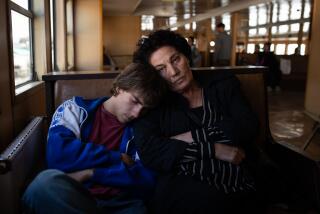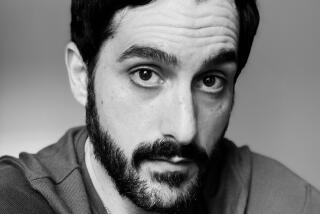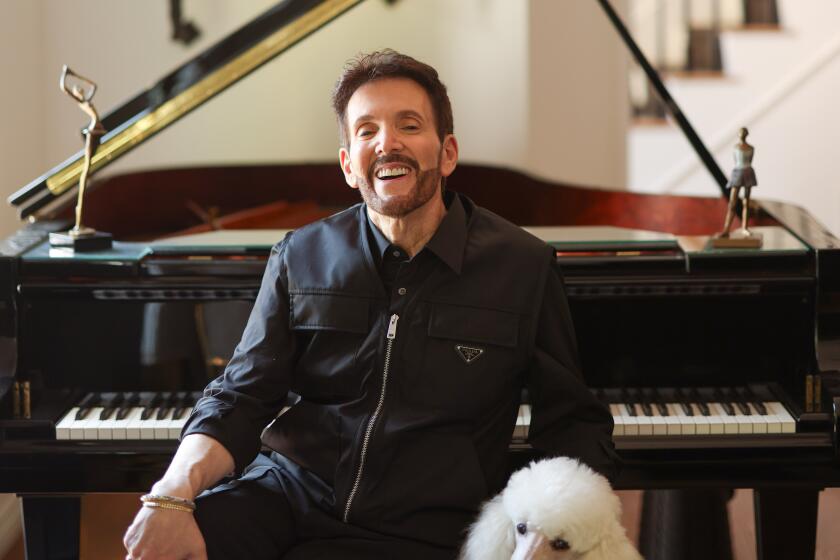Review: The engrossing dramas ‘Beanpole’ and ‘And Then We Danced’ find love in a hopeless place
A great and terrible sadness hangs over every frame of “Beanpole,” the extraordinary new movie from Russian writer-director Kantemir Balagov. Set in Leningrad in the fall of 1945, the movie slowly cracks open the bond between two women, Iya (Viktoria Miroshnichenko) and Masha (Vasilisa Perelygina), close friends who are both deeply scarred by the fresh traumas of World War II. You might say they’re lucky to have each other, except that more than once, the opposite also turns out to be true. In any event, they now inhabit a post-cataclysmic world where luck has no place and every moment crystallizes an enormous struggle to survive.
Iya is the Beanpole of the title, so nicknamed for her skinny frame and towering height — and also, perhaps, for her intermittent episodes of paralysis, when her entire body stiffens up, as though trapped between a seizure and a fugue state. During these episodes, we hear an eerie, high-pitched whine, plus the alarming sounds of Iya quietly gasping for air — an effective metaphor for the shellshocked populace of this recently besieged city, still trying to catch its collective breath. They’re also a vestige of a medical condition that got Iya discharged from military service years earlier during the war, allowing her to return home to Leningrad with a young son, Pashka (Timofey Glazkov).
Now the fighting has ended, and Iya — painfully withdrawn, spectrally pale and stirring to life only in Pashka’s presence — tries to pick up the fragments and move on. But she can’t move on anymore than the world around her can: Even if the war is technically over, it remains a permanent condition, the only existence anyone knows. You see this in the rows of injured and immobilized veterans she cares for in her job as a hospital nurse. But you also see it in the lost, zombified gazes of the people in the background, the ones passing her in a hospital corridor or lining up to board a streetcar in a public square that once bustled with activity.
Perhaps Balagov’s most acute insight is that when devastation is the order of the day, people become numb even when things take a turn for the worse (and yes, they can always get worse). Something unbearably, shatteringly cruel happens early on in the movie, but while you may gasp in shock and horror, for the other characters it’s just one more blow to absorb. That’s true of Masha, too, when she returns home from the war front wearing a strange, uncomprehending smile that barely falters when she hears about her and Iya’s latest bout of very bad news. And yet that bad news sinks in deep nonetheless, spurring Masha to take actions that are both inscrutable and decisive.
The brilliance of “Beanpole” is that it begins as the story of a collective horror, then becomes utterly, fascinatingly specific. The fate of women during and after wartime has too often been treated as a cinematic-historical footnote compared with the trials and tribulations of men, and Balagov and his co-writer, Alexander Terekhov, have noted that they drew inspiration from Svetlana Alexievich’s “The Unwomanly Face of War,” a book of monologues from women who lived through World War II. But “Beanpole” grows more specific still; like all good movies, it speaks for itself first and foremost.
Certainly the codependent dynamic between Iya and Masha — the feelings of guilt, confusion and jealousy that ricochet silently between them — is too twisted, disturbing and strangely entrancing to be described in terms of a common experience. To put it in the simplest possible terms, Masha, whose wounds are physical as well as psychological, comes to believe that only Iya can give her what she wants, what she needs for life to have meaning again. The sad history that binds them is articulated not through exposition — people here don’t talk about their troubles; what would be the point? — but through expressions and glances, and through the physicality of the actors themselves.
There are other characters who pass meaningfully through “Beanpole”: a young man (Igor Shirokov) who becomes besotted with Masha, a kindly doctor (Andrey Bykov) whom she also tries to co-opt as a pawn in her scheme. But the movie maintains a laserlike concentration on Miroshnichenko and Perelygina, who both give astonishing, inextricably connected performances. Iya stands at a remove, tall and quiet, her complexion so pallid she almost seems translucent. Masha is smaller but also fiercer, more determined, and when she isn’t staring into space her eyes can suddenly blaze with mischief.
As stark and grimly realistic as “Beanpole” is, Balagov adds another expressionist layer. Some of the movie’s most powerful moments transpire in the cramped apartment that Masha and Iya share, and for all its squalor and disarray, the place, as shot by the gifted cinematographer Kseniya Sereda, also has a wistful, incongruous beauty. Sergey Ivanov’s production design is full of retina-searing flares of red and green, Christmassy colors that are reinforced by the sweaters the women wear.
Will they ever know this kind of brightness and cheer again, or are their clothes and peeling wallpaper expressing emotions that they cannot? Balagov doesn’t say, but in spite of it all he leaves you with a shred of hope. It’s as though the director were channeling both the austerity of one of his mentors, Russian filmmaker Alexander Sokurov, and the lush palette of Douglas Sirk, the Hollywood filmmaker whose 1950s melodramas turned bold slashes of color into a whole new language of feeling.
“Beanpole” first premiered in a sidebar at last year’s Cannes Film Festival, where Balagov, a prodigious 28-year-old talent, won a directing prize. (This is his second feature after his controversy-stirring 2017 debut, “Closeness.”) There’s a certain perversity in the fact that this overwhelmingly bleak story about the enduring and destructive power of platonic love — and also the uselessness of erotic love — is being released in L.A. theaters on Valentine’s Day. For audiences looking for a more conventionally moving art-house romance, this week also sees the arrival of the luminous and absorbing coming-of-age drama “And Then We Danced,” which hails from the former Soviet republic of Georgia.
“Beanpole,” shortlisted for the international feature film Oscar, was submitted to the motion picture academy by Russia; “And Then We Danced,” though shot and set in the Georgian capital of Tbilisi, was submitted by Sweden. Its writer-director, Levan Akin, is a Swedish-born filmmaker of Georgian descent who had to shoot the picture under difficult, ever-changing conditions and tight security: A story of romantic love between two men was still deemed too taboo for a society where homosexuality is legal but homophobia runs rampant. (Local screenings of the movie last year were fiercely condemned by conservative politicians and pro-Russia groups.)
The strict conservatism of traditional Georgian culture is one of Akin’s key targets, but it’s also a subject that clearly fascinates him. The movie unfolds in the world of Georgian folk dance, where Merab (a superb Levan Gelbakhiani), a 20-something dancer with a broad, elfin grin, dreams of becoming a member of the national ensemble. His parents, now separated and poor, once harbored such dreams themselves. His ne’er-do-well older brother, David (Giorgi Tsereteli), also dances, though often misses practice due to his late-night drinking binges.
Merab, responsible and hard-working, is his family’s best hope for the future, rehearsing tirelessly by day with his longtime dancer partner, Mary (Ana Javakishvili), and working as a restaurant waiter by night. But the dance community is fiercely competitive, and the stern instructor (Kakha Gogidze) criticizes his body and gestures as too soft and effeminate (“You should be hard as a nail!”), and orders him and Mary to keep any hint of seductive playfulness out of their tightly choreographed movements. “There is no sex in Georgian dance,” he declares with a straight face, laying down a challenge that the movie will proceed to demolish.
But the object of Merab’s affection isn’t Mary, despite their nominal couple status. It’s Irakli (Bachi Valishvili), a handsome, muscular young man who has just joined their troupe, claims to have a girlfriend back in his home city of Batumi, and turns out to be a more seasoned dancer than Merab. But any sense of rivalry is quickly engulfed by the power of their shared attraction, as the intense physicality of their dance moves (shot with a fluid, focused camera by Lisabi Fridell) quickly takes on an erotic dimension. Their friendship and flirtation play out in secret, though Merab, drawn not only to Irakli but also to Tbilisi’s underground LGBT nightlife, can keep the truth hidden for only so long.
Audiences who have seen other exquisite gay romances of recent years, like “Call Me by Your Name” or the under-appreciated “God’s Own Country,” will not be surprised by how “And Then We Danced” plays out. But the story is rescued from its somewhat formulaic groove by the vividness of its milieu and the vitality of the performances. Tellingly, Merab and Irakli’s relationship is endangered not only by the threat of exposure, but also by the soul-crushing challenges and upheavals of family and working-class life, which encourages young people not just to conform but to settle.
But in its most rousing moments, “And Then We Danced” suggests another way forward. Its narrative moves may not be terribly original, but even the most traditional steps can be executed with force and feeling. And some of them can even be turned on their head. Akin builds to a climax in which the art of traditional dance — projecting a rigid, desexualized vision of masculinity that Merab has no interest in upholding any longer — is thrillingly subverted and reclaimed.
‘Beanpole’
Not rated
In Russian with English subtitles
Running time: 2 hours, 19 minutes
Playing: Starts Feb. 14, Landmark Nuart Theatre, West Los Angeles
‘And Then We Danced’
In Georgian with English subtitles
Not rated
Running time: 1 hour, 53 minutes
Playing: Laemmle Playhouse 7, Pasadena; Laemmle Royal, West Los Angeles; Laemmle Town Center 5, Encino
More to Read
Only good movies
Get the Indie Focus newsletter, Mark Olsen's weekly guide to the world of cinema.
You may occasionally receive promotional content from the Los Angeles Times.











